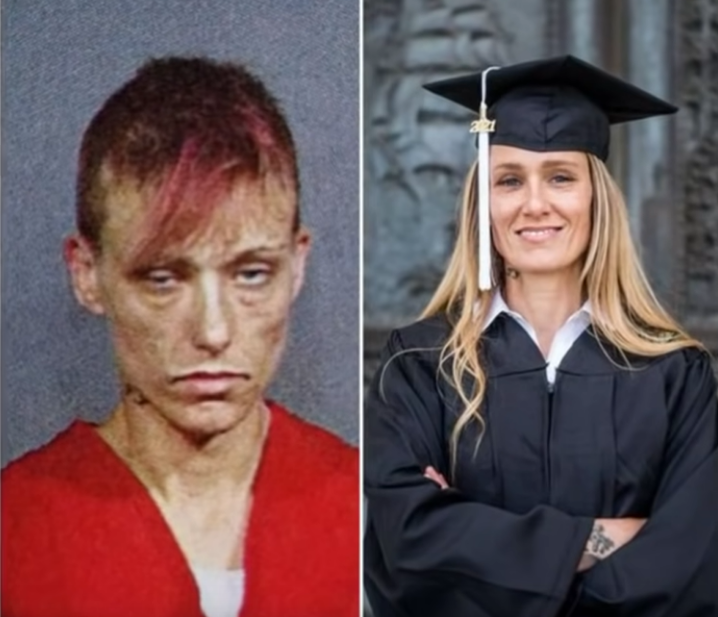Ginny Burton: A Story of Success
Community College is a stepping stone...
Eric's Heroes: The redemption of Ginny Burton
SEATTLE - It was several years ago and I was working on a documentary that would eventually be called, "There But For The Grace of God...", trying to understand the epidemic of homelessness that had gripped Seattle and so many other places.
I was wandering the streets of Seattle with my cameraman Doug, going to the places where broken people sought refuge. I walked into a men's shelter called Lazarus Day Center, run by Catholic Community Services. I don't know what I was looking for. I just wanted to talk to somebody and learn.
I introduced myself to a woman who was working there. She had long hair and seemed tired. She was being pulled in about five different directions, and seemed a little suspicious, but she stepped outside and talked to me for a few minutes.
We talked about drugs and addiction and homelessness. About the men at Lazarus. And then she excused herself and went back inside.
I sensed that there was more, that there were things she was holding back.
And, for some reason that I still don’t understand, I couldn't stop thinking about her. Again and again, over the course of many months, my instinct told me that there was something about the woman at the men’s shelter, something special. At the time I couldn't articulate what it was.
Years later now, I realize what "the something "was: an honest and profound truth born of a life lived authenticity.
Her name is Ginny Burton.
Two years later I was working on another project, and I called Lazarus, but Ginny no longer worked there. They gave me the number of someone who knew her, though, and that person relayed my message.
When she called I said, "I don't know why, but I think I need to talk to you again..."
And so we talked. Many times. And there was trust and eventually friendship. When she told me the story of her life, I was heartbroken and devastated. But I was also enthralled because I believed that the human suffering on our streets was unnecessary, that the addiction and death we had become so comfortable with didn't need to be so. That there was a path to freedom and redemption. And that here, before me, was living proof.
This is Ginny's story. She is my Hero.
She was born in Tacoma. 1972. She was one of seven children born to a mother who was a drug addict and a drug dealer and who suffered from mental illness.
Her father was sent to prison when she was four for a string of armed robberies.
Her mother introduced her to marijuana at the age of six.
She got her using meth at age 12.
By 14 she was smoking crack.
At 16 she was raped by a man who bought drugs from her mother.
By 17 she'd attempted suicide for the first of many times.
She got pregnant and the baby’s father was shot and killed.
She eventually had two children and married into an abusive relationship.
At 21 she started shooting heroin. By 23 she was a full-on, hardcore heroin addict.
Ginny Burton, a little girl surrounded by squalor and addiction and violence, had become a grown woman surrounded by squalor and addiction and violence. She never had a chance.
Ginny and a guy named Jack used to feed their addiction by robbing Mexican drug dealers at gunpoint. They knew that they wouldn't go to the cops because they were undocumented.
She was hell on wheels.
She said to me once, "I am that person. I have 17 felony convictions. I am the person you used to clutch your bag when I walked by you. I am the person that would randomly attack somebody in public. I was not a savory person. Everybody was a victim, and everybody was prey."
The pictures of Ginny in those days tell the story of a young woman who was reeling out of control, a swirling, churning blur of chaos and self-destruction. Jail cells, guys that hit her, self-loathing, criminal behavior. She stole cars. She shot somebody.
Her children were taken away. And drugs. Always, there were drugs.
I asked her what it was like in those days, what she saw when she looked in the mirror. And when she answered, her voice rose and she talked faster and faster, as if the memory was something she was trying to drive from her mind forever. And her words... her words have never left me.
“When you're stuck on the street and you smell like feces and you haven't showered in forever and you can't make it into a social services during working hours because you're too busy trying to feed your addiction, and your addiction is bigger than you... and you've compromised your integrity a number of times over and over and over again, and you're starting to be victimized by the people on the street... you're hopeless. You can't stand your life. You would rather be dead than alive. I spent most of my addiction wishing that somebody would just blow me away."
Three times she went to state prison. And she says that each time she got clean and had time to think and contemplate what she wanted to change about her life. “It really afforded me the ability to stop and think about what I wanted my life to look like. It gave me the opportunity to let the fog clear.”
The problem was that she didn’t have the tools to make that happen, and so she would get out of prison and go back to the same people, the same lifestyle.
“This beast woke up,” she says now, this beast that was so much bigger than I was. I would tell myself, ‘I am not going to use tomorrow. I am not going to use’, but at the latest by 2 p.m. the next day I was always using.”
And she describes a “drug vortex” that she could never escape.
“When I was clean I thought about using, and when I was using I thought about getting clean.”
And so it went, on and on. Her last trip to prison was in 2008. She was in for 33 months, and she stayed clean for six months after she got out. But she relapsed for the umpteenth time and was arrested one last time on Dec. 5, 2012, and she says it saved her life.
She'd been committing forgery crimes in Tacoma and had been up all night, high on meth and heroin. She was heading to Walgreens. "I was in a stolen truck. A really slow one. I pulled out and a cop turned on the lights to pull me over for a light that was out. I took off and he chased me. I almost crashed into a tree in front of an apartment building. And that was it. that was the end."
She recalls sitting in the back of the police car, handcuffed and happy. Relieved. "I knew I was OK. I knew when he put the handcuffs on me and put me in his car, I knew my life was going to change and it was then, in that moment, that I made the decision to turn it around no matter what it took."
Her charges were transferred to King County, and she begged to be put into the Drug Diversion Court program. She went through a treatment program at the Regional Justice Center. And got clean. And stayed clean.
Ginny never looked back.
She did Social Service work for the Post Prison Education Program, and at Lazarus for seven years. And she watched and learned. She told me something that nobody wants to hear. She said that in those seven years, working with hundreds of addicts, she knew of exactly two people who were able to voluntarily get clean and who stayed that way. Two.
And she started going to school.
In the beginning, she took classes at South Seattle Community College, a grown woman taking classes with kids, feeling out of place and awkward, but also inspired. Awakened.
"It made me recognize how much time I had wasted in my life. And I also recognized that I was actually good at learning. something i enjoyed. "
She applied to the University of Washington and was accepted. In 2019 she was awarded a Martin Honor Scholarship to the UW and there before her the path opened up.
She studied political science. And maybe it was then, at the age of 47, surrounded by kids from nice homes with nice parents who attended college parties on weekends and whose paths had been laid out for them since birth, maybe it was then, perhaps for the first time in her life, that Ginny Burton realized just how smart she really is.
"I was entering into a bunch of areas I had never experienced before," she says now. "I had a lot of insecurity at first, I was significantly older than the majority of people I was sitting in classrooms with. And I was reading up to 350 pages a week in a field I had no understanding of."
But she did it, and she excelled.
She made the all-academic team at the university.
She was the 2020 Truman Scholar for the state of Washington.
While all of this was happening, she was working on reconciling her relationship with her husband, Chris Burton, who had been incarcerated and was recently released.
Chris, like Ginny, is clean now, and he has watched and learned as his wife has proven over and over again that for some people there are no limitations.
He says, "I see a lot of the things behind the scenes, the hard work she puts in, the passion, her fire. She really genuinely wants to help people. She wants to help those at the bottom rise to the top, and I believe that she will."
The other day Ginny put on a cap and gown and posed for graduation pictures. She looked happy and beautiful and proud and full of possibilities.
And she posted to Facebook two stunning before and after photos. One was taken in a red King County jumpsuit in 2005. Her head was shaved and there were sores from picking at her face during addiction. She'd been using 1/4 ounce of heroin per day when the picture was taken. She looked sad and strung out and infinitely tired.
In the other picture, taken that day with the cap and gown, she looked happy and beautiful and proud and full of bright, endless possibilities.
Next to the two pictures, she wrote these words: "Today I've let go of feeling insecure about my age, the lines on my face, my genetics, my failures, and imposter syndrome to recognize that no matter what if I'm still breathing, I can do anything I set my mind to. Graduating at 48 from the Political Science department at the University of Washington Seattle is a real accomplishment for this former quitter."
She and Chris have moved away from Seattle to the small town of Rochester. They are adding an apartment to the home of Chris's grandparents. There is peace and solitude around them. And flowers and trees.
Ginny wants to change the world and believes she can. She wants to get her master's degree and use it to save lives by changing prisons, so that addiction is tackled head-on on the inside, but also out in the world, where she sees what she calls a "learned helplessness" that she considers a death sentence.
She knows. Ginny says she's been to more than 20 funerals in the last seven years, funerals for friends who were drug addicts, people who she believes have been loved to death by Seattle and king County and a culture of tolerance at all expense.
"Nobody wants to hurt anybody's feelings," she says, "everybody wants to be loving and supportive, which means we don't hold up a mirror to people. We don't want to tell anybody they can't do this, we're just going to support them to death. We're gonna love them to death."
Sitting on the lawn with rhododendrons in full bloom behind her, she continues, "It's not love. I am grateful the Pierce County Sheriff's loved me enough to arrest me. I am grateful that the judges loved me enough to incarcerate me because those incarcerations gave me an opportunity to work myself into changing my life."
To know Ginny Burton's story is to believe that no soul is irredeemable. To look at her before-and-after pictures is to understand that truly, anything is possible.
"My story isn't an accident," she told me. "I think it will be used for everybody else. Maybe I can be some kind of Pied Piper, to help people recover their own lives. That's what I care about. There are some days that I wish I could just slip away here, with a garden, and open up a little cafe. But in reality, I know it's my job to continue to create hope."
Will she pull it off? I believe she will. The force of this woman’s will is indisputable. Her story is undeniable, her particular truth irrefutable. And now she understands these things. It’s what I sensed that first day at the men’s shelter, but couldn’t quite put my finger on: Ginny Burton is the truth.
We want to hear about the heroes where you live. Send us an email to [email protected].









Share On: